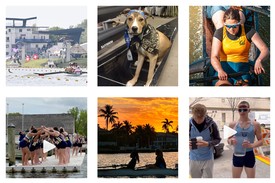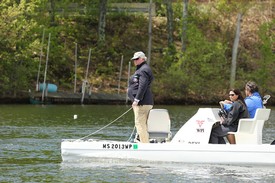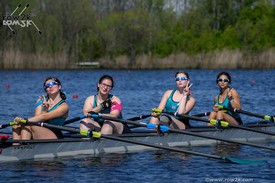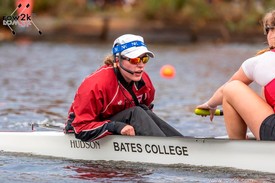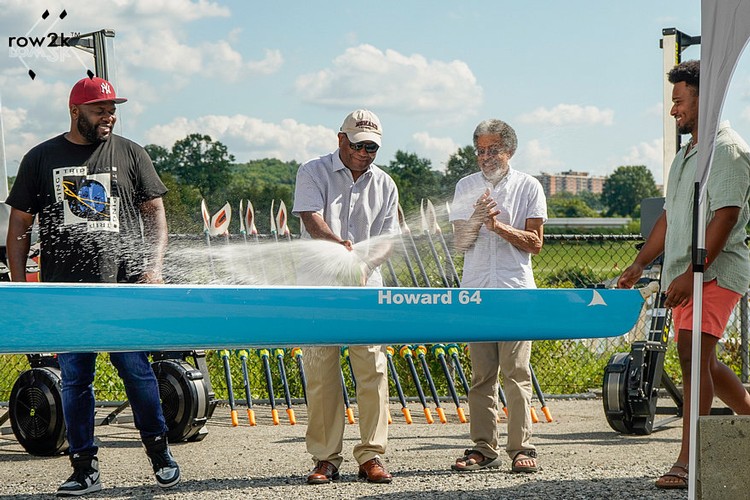
See our photo gallery from the event here.
The Washington DC rowing community gathered on the banks of the Anacostia this past Saturday to celebrate the dedication of a shell named to honor the legacy of the Howard University crews which became, in the 1960s, the first all-Black rowing team in the US. That team was a varsity sport at Howard until it lost its funding in 1972 and disbanded.
The Hudson shell is a recent addition to the Unity Boat Club's fleet, made possible by the continuing efforts of Arshay Cooper and the A Most Beautiful Thing Inclusion Fund (AMBTIF) to break down barriers in rowing and support programs that help create diversity and inclusion within the rowing community.

Cooper, who came to DC for the christening with fellow AMBTIF Board members Aquil Abdullah and David Banks, noted in his remarks that the event and boat naming was about honoring the past, present, and future of rowing in the Washington DC area. The weekend included a Friday night viewing of the film "A Most Beautiful Thing" at Potomac Boat Club and a panel discussion that featured members of that pioneering Howard University rowing team. Cooper and Banks also appeared on C-Span's Washington Journal program Saturday morning to talk about rowing as a tool for social change.

The boat, the 19th donated so far by the AMBTIF, has been in the Unity Boat Club fleet for a year and has already been out on the racing circuit, taking athletes from the DC area to races like the Head of the Schuylkill last fall. That was an experience very much in line with the vision Cooper has for his work and the AMBT Inclusion Fund: putting kids in boats and giving them the same opportunity to travel and race that he and his Manley crew experienced, and that formed the basis for his book, the film, and the mission of the AMBTIF.

What made this ceremony special was the name on the boat itself--Howard 64--and the fact that there is a rich past that the young people of the present connect with when they row this particular boat.
Though the Howard program ceased to exist many years before the current Unity Boat Club athletes were even born, the efforts of the local rowing community, led by Unity head coach Patrick Johnson, to research and reconnect with the historic crew has brought the Howard crew back to life as a model and inspiration for the young people rowing out of the Anacostia Community Boathouse today.
Two members of that Howard rowing team, Allen Nesbitt and Roland Daniels, made the trip back to DC this weekend, some sixty years after their rowing days at Howard.

When asked how it felt to return and to speak to young people excited to succeed in the sport he enjoyed, Nesbitt said, "It really makes my heart feel good because if you can see it, you can be it, so for people to see oarsmen and ladies who rowed [in the past] and see people of color is really good for my heart.
"My entire Howard experience was vastly enriched and improved because of rowing," said Nesbitt. "I'm really honored and thrilled that the diverse community that invited me here is so vibrant and so organized. It's not just one club or a couple of clubs, there's whole community here."

That community on Saturday included representatives from the other teams that share the Anacostia Community Boathouse, folks from PBC and Thompsons, the clubs on the Potomac River side of the city, and several officials from the local government: Eboni-Rose Thompson, the President of the DC State Board of Education, as well as Ashley Emerson and Thomas Bowen, the former and current Directors of the Mayor's Office on African American Affairs.

Nesbitt and Daniels both moved away from rowing and DC after graduating, but they reconnected to each other and the DC rowing community through the efforts of Kim O'Connell, a journalist - and crew mom - who started researching the history of the Howard rowing team a few years ago. She was looking, she mentioned, for another great rowing story after reading both "Boys in the Boat" and Cooper's "A Most Beautiful Thing," and she published her findings on the Howard Crew in Smithsonian magazine last year in "The Barrier-Breaking Rowers of America's First All-Black Crew Team."
The name on the shell - Howard 64 - commemorates one of the events covered in O'Connell's article: the year when the program, just a few years old at the time, triumphed over the other DC collegiate crews from American University, Georgetown, and George Washington to win the D.C. Regatta.
"I was in awe, to see 'Howard 64' on that boat," said Daniels, who joined the team as a coxswain in 1965 just after that first big win. "It just brought back memories and I felt honored that Unity Boat Club would think enough of what we did back in the 60s to christen that boat."

"At the time, I didn't have an appreciation for the history that was being made, honestly. It was a lot of fun to be out on the water. It was fun with the guys and it was truly an experience to go to different cities and row in competition.
"For me, it was eye opening, being able to do that. I remember in Philadelphia, at the Dad Vail Regatta, that people would stop and just look at us. I mean, I knew that we were perhaps the only [Black team] but I didn't really appreciate the history and the legacy that could possibly be made from it."
For many years, that story of the Howard crew was not well-known even in DC. While the team's efforts were mentioned briefly in the sixties by an article in Sports Illustrated and another in Ebony magazine, the fact that the team folded in the early seventies largely prevented the Howard crew and its story from becoming a model or inspiration, until recently.
Even Abdullah and Banks, Black Olympians who each grew up in the DC area, did not find the sport by hearing about the pioneering Howard crews: Abdullah joined his high school team in the off-season from football, and Banks walked-on after he got to Stanford.
"It was like a myth," Abdullah said when asked if he had known about the Howard crew; something he only heard about after he started rowing, despite the fact the Howard team had blazed their trail for Black rowers on the same Potomac River where he would learn to row years later.

Daniels said that having a boat that bears the name of the historic Howard program could make that legacy more concrete and visible.
"That is very significant," he said. "To look at the faces of these young kids and [to see] their interest in rowing and their enthusiasm. That's what it's all about for me."

Daniels remembered how, at the time, not even many students at Howard even knew about the team, and the sport was as new and unknown to their parents and families as it was to the Howard rowers themselves.
"A lot of the differences have to do with legacy," he said. "We rowed against kids at Yale, but perhaps their fathers or grandfathers rowed, so they knew about rowing. There was a legacy [for them]. There's no legacy, right? Where we were [at Howard] in the 60's, there was no legacy. When I told my dad, who never finished high school, [about crew], my dad said, "What? What is crew?"
Nesbitt, who was on those first teams as the program started and in the Howard 1964 crew itself, and found crew tremendously rewarding, remembers that he and his teammates still had to face racism when they travelled.
"We were invited up to New York to row against Columbia and Iona, but on the way up we stopped halfway to get some grub in Delaware. I could see the Delaware Memorial Bridge, which led to New Jersey once you cross that river, which is where I grew up. I went to a restaurant to try to get something to eat and they would not serve me.
"That was the spring of 1963. I got refused service for the first time in my life, on a crew trip, heading up to New York, in Delaware. At the time, I told the coach what happened and he was not happy, but he was not unhappy enough to do anything. Especially since he was working at the university, his mission was not to go protest somewhere; his mission was to go win races and get us exposed to the racing environment."
Being back in DC, and seeing the community that now supports rowing, Nesbitt said:
"It inspires me. I'm not sure what I can do in my own community, but I'm going to investigate that when I get back.
"I've been out of rowing since I left Howard," said Nesbitt, "but I always found rowing to be a physical challenge and a mental challenge; once you get a taste of rowing, it's in your blood."
For Daniels, to see an actual Howard crew back on the water would be a great next step:
"It would be a real dream to see Howard bring it back," he said. "I don't know how that happens, but that would be really fantastic."

If you enjoy and rely on row2k, we need your help to be able to keep doing all this. Though row2k sometimes looks like a big, outside-funded operation, it mainly runs on enthusiasm and grit. Help us keep it coming, thank you! Learn more.
Comments | Log in to comment |
There are no Comments yet
| |
- Bont Rowing
- Calm Waters Rowing
- Concept 2
- Craftsbury Sculling
- The Crew Classic
- CrewLAB
- Croker
- Dad Vail Regatta
- Durham Boat Co.
- Empacher
- Faster Masters
- Filippi
- Fluidesign
- h2row.net
- HUDSON
- Live2Row Studios
- Nielsen-Kellerman
- Oak Ridge RA
- Peinert Boat Works
- Pocock Racing Shells
- Race1 USA
- Rockland Rowing Masters Regatta
- RowKraft
- Rubini Jewelers
- Vespoli USA
- WinTech Racing
- Bont Rowing
- Calm Waters Rowing
- Concept 2
- Craftsbury Sculling
- The Crew Classic
- CrewLAB
- Croker
- Dad Vail Regatta
- Durham Boat Co.
- Empacher
- Faster Masters
- Filippi
- Fluidesign
- h2row.net
- HUDSON
- Live2Row Studios
- Nielsen-Kellerman
- Oak Ridge RA
- Peinert Boat Works
- Pocock Racing Shells
- Race1 USA
- Rockland Rowing Masters Regatta
- RowKraft
- Rubini Jewelers
- Vespoli USA
- WinTech Racing



